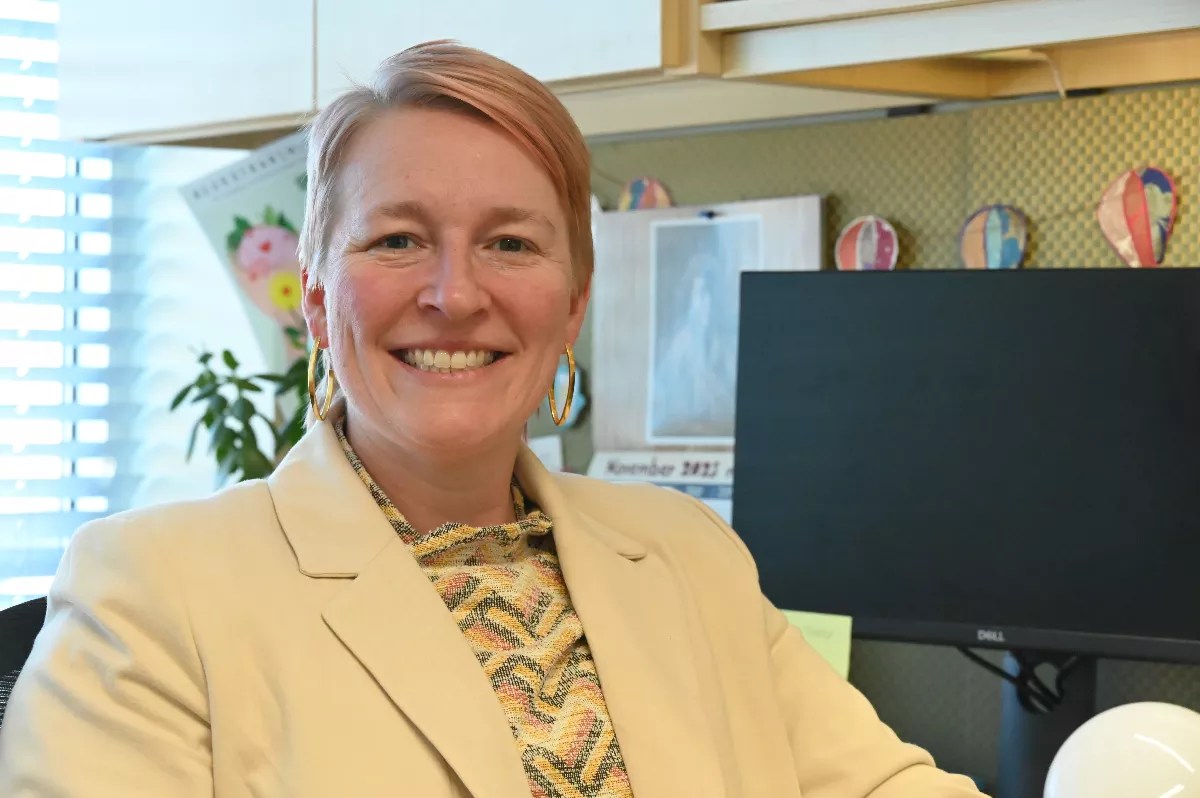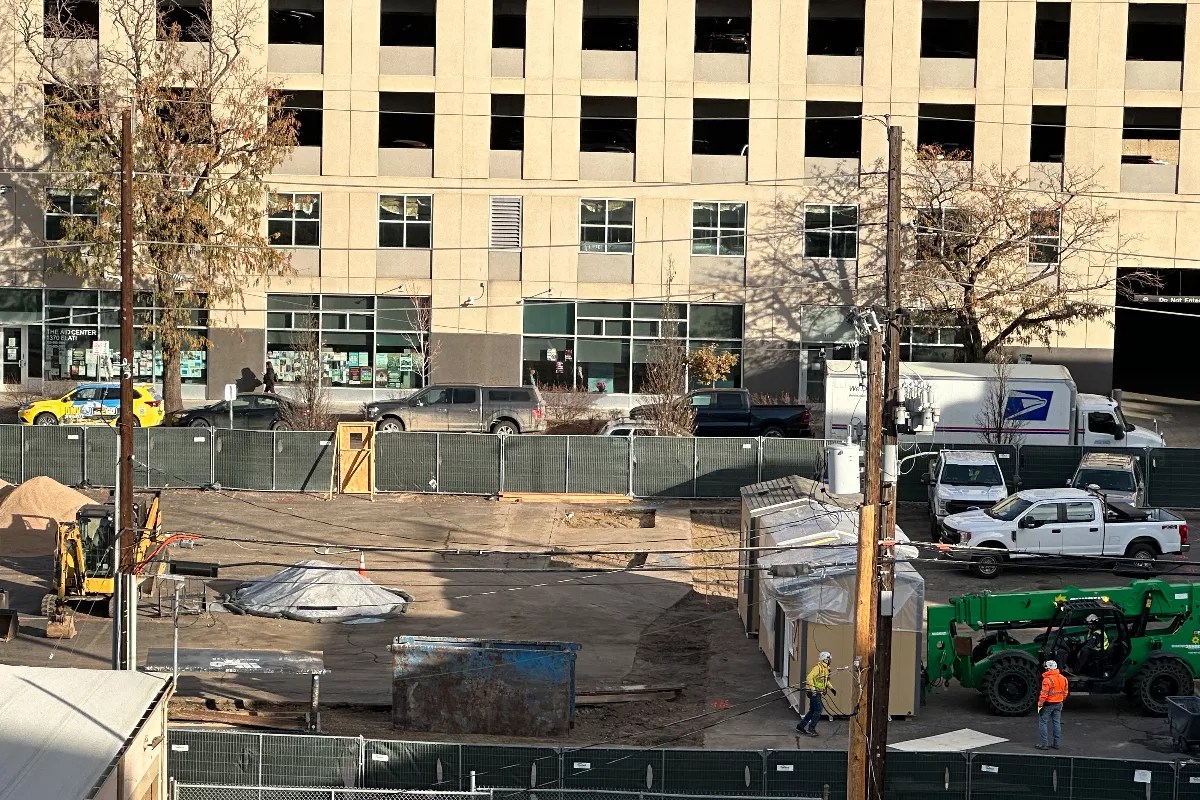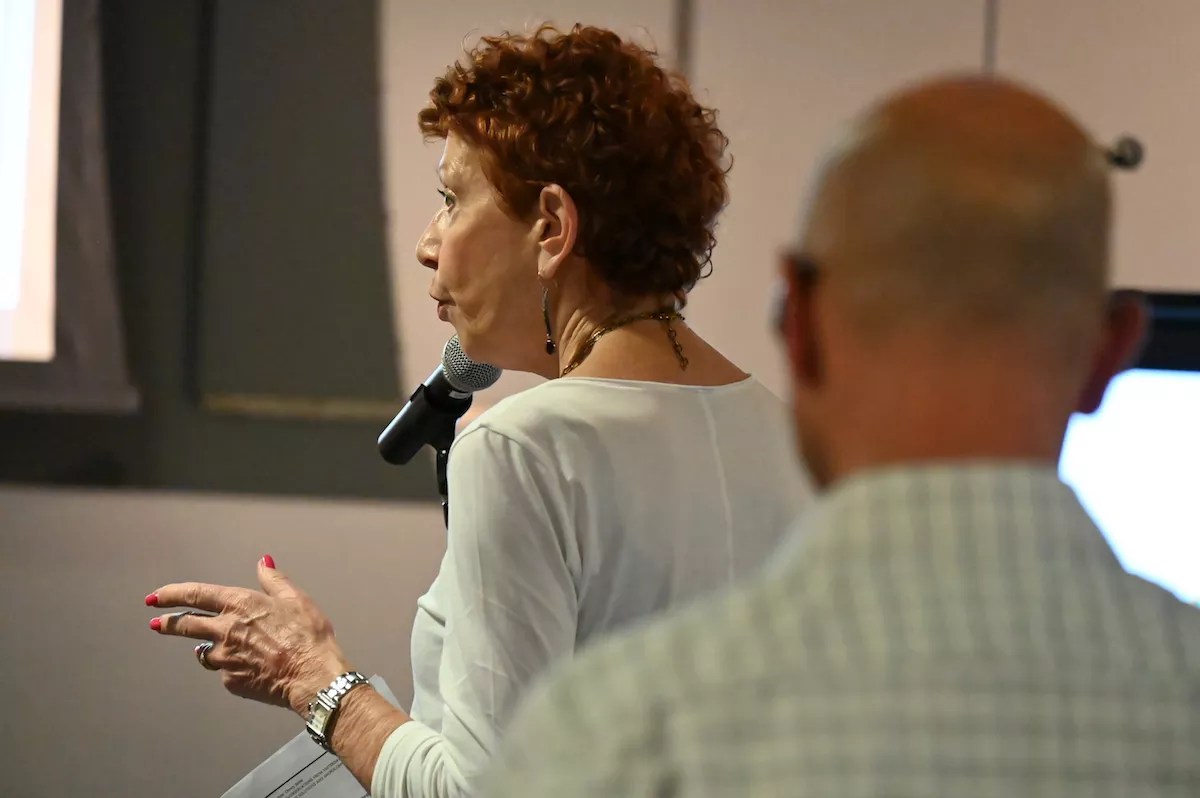
Bennito L. Kelty

Audio By Carbonatix
After breaking ground in early November – and with just over three weeks to go until Mayor Mike Johnston’s House1000 deadline hits – the City of Denver has officially inked its deal with the Gathering Place to run the Golden Triangle’s micro-community on Elati Street.
Denver City Council approved a $1.5 million contract with the homeless service provider on Monday, December 4, that puts it in charge of the 44-unit site, dubbed Elati Village, for a year. The Gathering Place is the only provider in Denver that focuses on serving “women, transgender individuals and their children who are experiencing poverty,” according to its website.
“The community will be different because it is the only one of these three new ones that is gender-specific,” says CEO Megan Devenport, referring to the city’s three micro-communities currently under construction.
According to the city’s House1000 dashboard, 317 people have been put into housing through the mayor’s initiative. Micro-communities are expected to provide shelter for at least 500 more people, the dashboard says, with 300 beds in procurement and 200 acquired so far.
“What this offers for us is the opportunity to show what we do and the value of the significant impact that our approach to this type of care can have,” Devenport says of the Gathering Place deal. “We also are really excited about the opportunity to grow our team and to grow our reach. We don’t want to be big, big, big, but we want to be a little bit bigger.”
The micro-community at 1375 Elati Street will serve its nonbinary and transgender homeless residents in line with the mission of the Gathering Place, with policies in place to make sure everyone feels like “they aren’t being microaggressed and they feel they can look around and feel that the space is intended for them to feel welcomed,” Devenport says.
“The primary concern that we hear from our trans members is a need for dignity, privacy and acceptance,” she adds. “Those are three things that are in short supply in most places.”
The Gathering Place adheres to its mission by making sure the places it runs have “gender-inclusive bathrooms” and “gender-inclusive intake forms,” along with “training to and for all staff on how to talk to, about and with folks about their pronouns, about their identity, and to create a culture where mistakes are more viewed as an opportunity for learning,” Devenport explains.
“We’re not going to get it right all the time,” she admits. “It’s really critical for there to be a culture of feedback and of learning.”
Micro-communities, along with leased units and hotel conversions, are one of the three main pillars of the House1000 plan. To deliver on his promise to get 1,000 individuals off the streets and into housing by the end of 2023, Johnston will need to house just under 700 more people over the next three and a half weeks. At least 88 individuals can go to the micro-community at the Elati site, Devenport says, which expects to house two people in each unit during its contracted year, six months for each person. But construction has yet to be completed.
If the city manages to get Elati Village up and running – and filled – before December 18, it will be able to contribute at least 44 people to the House1000 tally. (Residents need to stay in housing for at least fourteen days in order to be counted on the city dashboard.)

A bird’s-eye view of the 1375 Elati Street micro-community shows that construction is already well underway, with some homes already placed at the site.
Chris Perez
The Gathering Place brought in about $3.8 million in contributions in 2022, and offers its services mostly through a day shelter at 1535 High Street. It ran a 24-hour shelter at the former Rodeway Inn at 4765 Federal Boulevard until August, but had to shut down operations after the city declined to renew that contract.
Operating these shelters should prepare the Gathering Place for managing a micro-community, though “it’s true that we’ve never run a community that’s a bunch of tiny little buildings,” Devenport notes.
“We feel really confident in our model, in how we provide services, in how we understand our role in relationship with people experiencing poverty or homelessness. That part will not be new,” Devenport tells Westword. “We also have great opportunity to build on the lessons from Rodeway Inn in providing 24/7 care, and so we’re feeling very cautiously optimistic about how much of this institutional knowledge will transfer over.”
The Elati micro-community contract actually began on December 1; it was made retroactive in order to cover expenses that the Gathering Place took on after that date. The city wants the micro-community to be operating by December 15, Devenport says.
The contract was supposed to go before city council on November 27, but it wasn’t put on the agenda for that meeting because of a “clerical error,” according to the Gathering Place and the Department of Housing Stability. The delay didn’t affect the contract, however.
“A simple clerical error delayed the filing of this resolution by one week,” says Sabrina Allie, a spokesperson for HOST. “Given that several hundred resolutions and ordinances go before city council annually, filing delays such as this occur occasionally, especially during a short holiday week.”
Staff compensation accounts for the biggest share of the $1.5 million contract. About $830,000 will go toward the salaries of fourteen full-time staff members, including two case managers making around $70,000 a year, a bilingual resource navigator at $62,000 a year, and a program director, who will hire staff and manage services at the site for $85,000 a year.
Another $340,000 will go toward equipment, supplies, travel reimbursements and translation services. Equipment includes furnishings for offices and the two community rooms planned for the site; materials and supplies will include food, bedding, hygiene items, bathroom items, sod and plants for the outdoors, and fencing for the dog park, according to the contract’s budget.
The Gathering Place has a handful of contracts with the City of Denver, but Elati Village “will be the lion’s share,” Devenport says. The others total about a half-million dollars, and involve the Gathering Place running shelters and offering homeless services throughout Denver.
Over the past few weeks, the nonprofit has been hiring and training the fourteen staff members it needs to run the Golden Triangle micro-community, Devenport says. Originally, she planned to have one staff member for every ten residents. But now she aims to have about a one-to-four staff-to-resident ratio.
Dede de Percin, executive director of the Colorado Village Collaborative, has also targeted rapid onboarding as her nonprofit prepares to run the city’s largest micro-community, in the Overland neighborhood.

Golden Triangle Resident Elaine Kamm talks at a community meeting on September 1 in response to two micro-community sites being planned for their neighborhood.
Bennito L. Kelty
CVC also operates a gender-specific tiny home village known as the Welcome Village, which serves women and the LGBTQ+ community at 4001 Monroe Street. Since CVC leaders have this experience, the Gathering Place has been picking their brains and “is relying on some of the best practices from their experience,” Devenport says.
The City of Denver included a $10,000 payment to the Gathering Place for consulting with CVC “to learn best practices from an existing micro-community provider and support planning and implementation,” according to the contract’s budget.
“We anticipate being able to work with CVC and being able to actually compensate them for their time and expertise,” Devenport says. “We’ve had conversations with some of their staff, with some former staff and with some of their residents or guests or members, and then I’m in communication with their CEO [de Percin] pretty regularly.”
The Gathering Place held focus groups with people who have experienced homelessness in order to decide how to run this micro-community. Devenport promises that it will be “member-led” in its design.
Elati Village, which sits in the northwestern corner of the Golden Triangle, was initially blasted by residents after it was pitched as one of two micro-communities for that neighborhood on the edge of downtown. The other, which was canceled by Johnston following the backlash, would have been on Bannock Street.
With council’s approval of the contract, the Gathering Place can now begin the process of creating a Good Neighbor Agreement, which Johnston has said will be critical to making sure nearby residents can hold homeless service providers accountable for the micro-communities.
Devenport expects to have a Good Neighbor Agreement in place by the end of December, though she admits that’s “a pretty aggressive timeline.”
Still, the Gathering Place is “committed to doing it if we can make it happen,” Devenport adds.
The nonprofit has been studying recordings of town halls and community meetings in the Golden Triangle to understand neighborhood concerns. Although its contract with the city runs just a year, Devenport says that she and the Gathering Place “absolutely hope to see continuity” and continue running the micro-community beyond 2024.
“We know the mayor is committed to working on housing stock, the actual pipeline of it to go in for folks. We know that’s not going to be ready in a year,” Devenport says. “So we want to be part of that near-term solution of ensuring that people are safe and being able to live in dignity as we get more affordable housing online.”